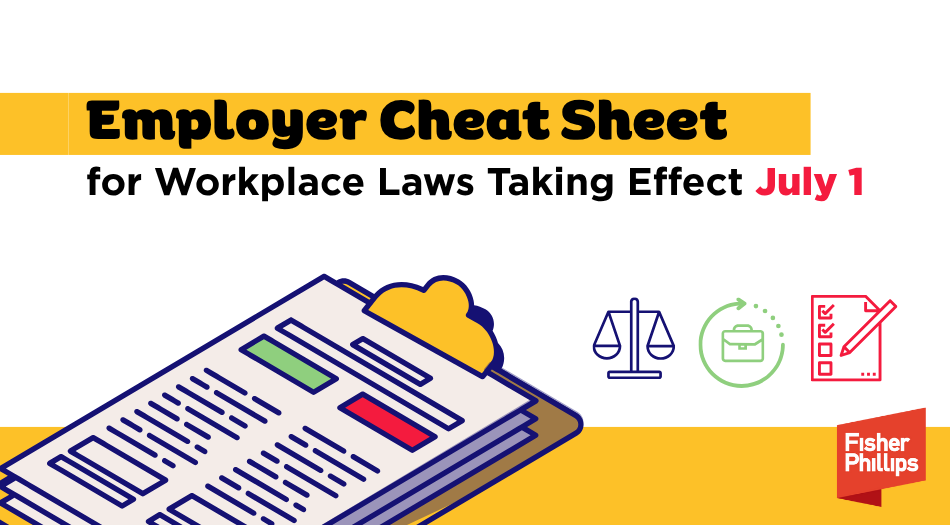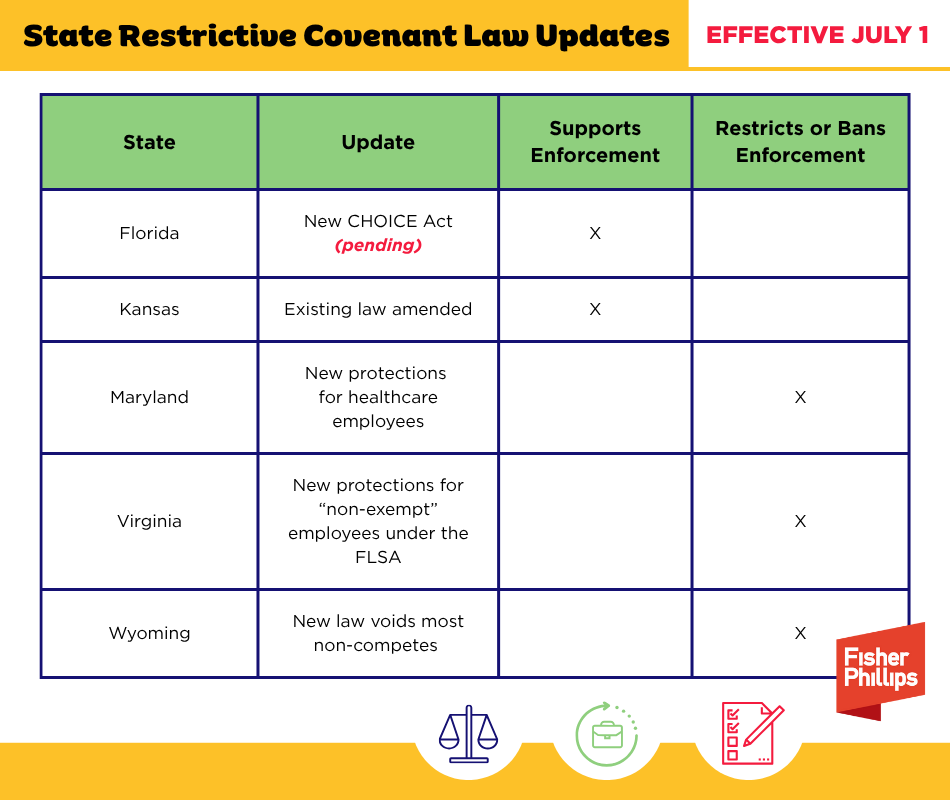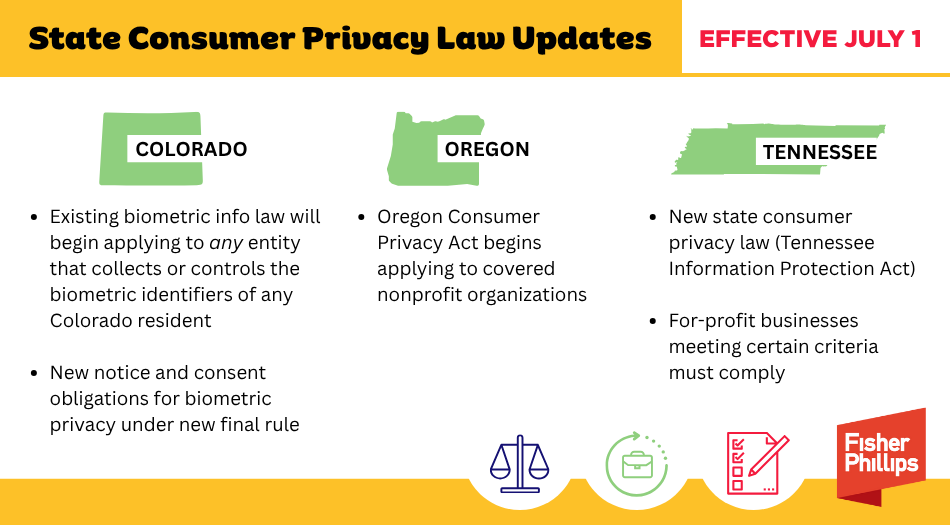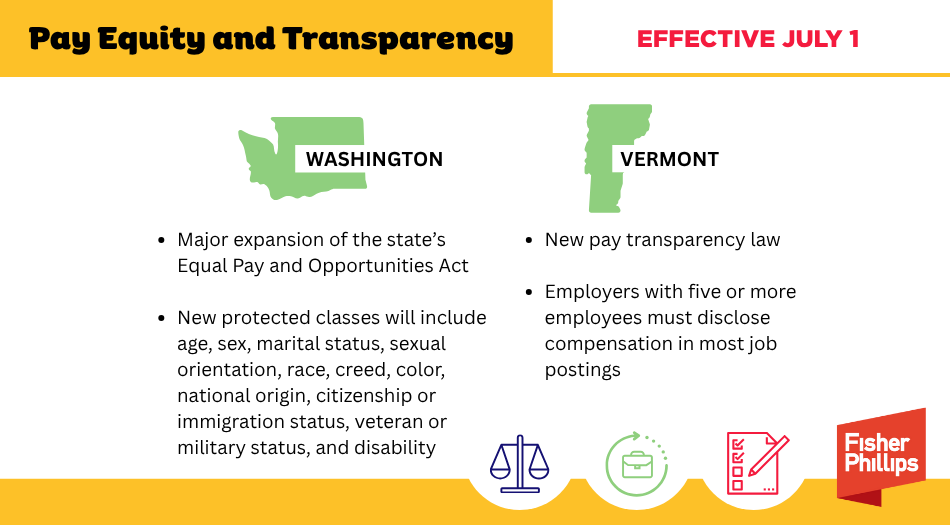Most employers are prepared for new laws at the start of each year – but did you know that a heap of new workplace laws take effect at the halfway point? Here’s your employer cheat sheet to prepare for July 1 effective dates:
Nationwide
- Division I College Athletics Fundamentally Reshaped. Most of the House v. NCAA settlement terms kick in July 1, including rules on revenue sharing with student-athletes, roster limits, and name, image, and likeness requirements. Read more about the settlement’s final approval and ongoing appeal (FP insights).
State Laws
Alabama
- Paid Parental Leave for Certain Public Employees (SB199). State employers and local education agencies must provide paid parental leave to eligible employees following the birth, stillbirth, or miscarriage of a child or the placement of a child for adoption.
- Expiration of the Temporary State Income Tax Exemption for Overtime Pay. Starting July 1, Alabama employers must resume withholding state income tax from overtime wages paid to non-exempt employees since the temporary exemption under Act 2024-437 will sunset on June 30.
Alaska
- Minimum Wage Increase. Alaska’s minimum wage will increase to $13 per hour. This change also raises the minimum salary (to $1,040 per week) for purposes of the white-collar exemptions to the state’s overtime pay requirements (state website).
- Paid Sick Leave Accruals Begin. All employers in the state will be required to provide paid sick leave to nearly all employees, who will be entitled to accrue one hour of paid sick leave for every 30 hours worked.
- Ban on Captive Audience Meetings. Employers will be prohibited from holding mandatory meetings for the primary purpose of sharing political or religious views.
These changes stem from a ballot measure approved by voters in 2024 (FP insight).
California
- Next round of healthcare minimum wage hikes. For example, the minimum wage rate will bump up to $24 per hour for workers at dialysis clinics and large healthcare systems. Here’s the full wage increase schedule (FP insight).
- Safety standards for household domestic workers. Learn more here (FP insight: see #5).
Colorado
- Expansion of the Colorado Privacy Act. The act’s privacy requirements for the collection of biometric information or identifiers will begin applying to any entity, including any employer, that collects or controls the biometric identifiers of any Colorado resident. Read more here (FP insight: see “History” section).
- New Notice and Consent Obligations for Biometric Privacy. Entities collecting biometric data will be required to meet stringent notice and consent requirements if they use or intend to use it for unique identification, thanks to a new final rule from the state’s Department of Law. Here’s what you need to know to stay compliant.
- New Rules for Local Government “Tip Credit” Calculations (HB25-1208). Local governments that enact a minimum wage will need to follow new rules for calculating tip offsets for tipped employees.
District of Columbia
- Minimum Wage Increases. The minimum wage for tipped employees will increase to $12 per hour, and the minimum wage for all other workers will increase to $17.95 per hour. Learn more here (government website).
Florida
- The CHOICE Act Kicks In (Pending). If enacted, the CHOICE Act would make Florida the friendliest state in the country for enforcing non-compete agreements. Here are three key steps for employers (FP insight). The bill (HB 1219) was presented to Gov. DeSantis on June 18 – we'll update the status once he acts on the bill.
Georgia
- Wage Protections for People with Disabilities (SB 55). Starting July 1, Georgia employers may not use certificates issued by the US Department of Labor to pay employees with disabilities less than the federal minimum wage. However, employers who were issued such certificates on or before July 1, 2025, may continue to do so, subject to a phase-out that begins in 2026 and ends with a complete ban on such subminimum wages effective July 1, 2027.
Idaho
- Ban on Employer Medical Mandates (SB 1210). Any business entity doing business in the state will be prohibited from requiring “medical intervention” – such as vaccines – as a term of employment, unless required by federal law or where necessary for required business travel.
Indiana
- Protected Leave for School Meetings (SB 409). All Indiana employers will be required to allow employees to take unpaid time off, subject to certain conditions, to attend a school conference or meeting for their child.
Iowa
- State Gender Identity Protections Eliminated (Senate File 418). Gender identity will no longer be a protected category under Iowa’s antidiscrimination law, which will also be updated to define “sex” as either male or female, as determined at birth.
|
Note: While challenges to federal gender identity protections are ongoing, gender identity remains a protected class under Title VII due to the Supreme Court’s 2020 Bostock decision. |
- Changes to Private Sector Drug Testing Rules (HF 767). Private employers will be able to designate “safety-sensitive positions” for purposes of a state law on workplace drug testing. In addition, employers will be able to offer employees the option to receive notifications and make requests related to confirmed positive test results either in person or electronically, rather than only by certified mail, and employees will have the burden of proof in civil actions.
Kansas
- Clearer Rules Supporting Non-Solicitation Agreements (SB 241). Kansas will become even more pro-enforcement regarding restrictive covenants – and, particularly, non-solicitation agreements.
Maryland
- Non-Competes Banned or Restricted for Healthcare Employees. Maryland employers will be prohibited from entering into new non-compete agreements with healthcare professionals earning $350,000 or less. For healthcare professionals with higher annual compensation, the use of non-competes will be materially limited. Learn more here (FP insight).
|
What’s not taking effect July 1? Maryland’s Paid Family Medical Leave Insurance law (FP insight), because state lawmakers pushed back the law’s implementation date to January 1, 2027. |
New Hampshire
- Accommodations for Breastfeeding Mothers (HB 358 (2023)). New Hampshire employers with six or more employees working in the state must adopt policies providing sufficient space and reasonable break periods for nursing employees that need to express milk during working hours.
New Jersey
- Airport Minimum Wage Increasing. The minimum wage for Newark Liberty International Airport workers will increase to $20.50 per hour. Read more here (FP insight).
New Mexico
- New Whistleblower Protections for Healthcare Workers (HB 586). Hospitals, management services organizations, and health care provider organizations that are owned or affiliated with health insurance will be prohibited from taking any retaliatory action against whistleblowers under certain conditions.
New York
- Airport Minimum Wage Increasing. The minimum wage for LaGuardia Airport and John F. Kennedy International Airport workers will increase to $20.50 per hour. Read more here (FP insight).
Ohio
- Deadline for Public Schools to Adopt Parental Involvement Policies. Ohio public schools have until July 1 to update their policies in accordance with the state’s new “Parents’ Bill of Rights Law,” which took effect in April. Learn more here (FP insight).
Oregon
- Nonprofits Will Be Subject to State’s Consumer Privacy Law. The Oregon Consumer Privacy Act will begin applying to covered nonprofit organizations (the OCPA took effect and immediately began applying to for-profit organizations.) Read more here (FP insight).
Tennessee
- Transfer of Power Over Antidiscrimination Enforcement (HB 910/SB 861). Effective July 1, the Tennessee human rights commission (THRC) will be dissolved and enforcement power over the state’s antidiscrimination laws will transfer to a newly created civil rights division within the attorney general’s office. Any complaint pending before the THRC on June 30 will be dismissed. Learn more here (state website).
- New State Consumer Privacy Law. The Tennessee Information Protection Act will apply to for-profit businesses that meet certain criteria and impose requirements related to universal opt-out mechanisms, privacy notices, and more. Learn more here and here (FP insights).
Vermont
- New Pay Transparency Requirements (H.704 (2024)). Vermont employers with five or more employees will be required to disclose compensation in most job postings. Read more about it here (FP insight).
- Expanded Employee Access to Unpaid Leave (H.461). Changes to the state’s Parental and Family Leave Act will provide equal access to caregiving leave to LGBTQ+ families, workers with low income, and individuals in nontraditional family structures. The update also broadens parental leave to include an employee’s recovery from childbirth or miscarriage, or to care for a foster child, and gives covered employees the right to safe leave, bereavement leave, and qualifying exigency leave.
- Changes to Various Wage Laws (S.117). A new law will, among other things, end the state’s subminimum wage for individuals with disabilities, learners, and apprentices, and provide enhanced penalties and reporting requirements for late payments of weekly benefits to workers’ compensation claimants.
Virginia
- Expansion of Non-Compete Ban (SB 1218). Starting July 1, Virginia employers will be prohibited from entering into or renewing non-compete agreements with employees entitled to overtime pay under the federal Fair Labor Standards Act. This latest change is in addition to the existing ban protecting “low-wage” employees.
- New Protections for Children in Online Content (HB 2401). For certain online and social media video content that includes the likeness, name, or photograph of a child under age 16, the content creator must compensate the child and set aside content earnings in a trust account for the child’s benefit.
- Workplace Safety Plan Mandate for Hospitals (HB 2269). Virginia hospitals will be required to establish a workplace violence incident reporting system to document, track, and analyze any incident of workplace violence reported.
Washington
- Major Expansion of the Equal Pay and Opportunities Act (HB 1905 (2024)). New protected classes under Washington’s pay transparency law will include age, sex, marital status, sexual orientation, race, creed, color, national origin, citizenship or immigration status, honorably discharged veteran or military status, or the presence of sensory, mental, or physical disability or the use of a trained dog guide or service animal by a person with a disability. Since 2023, the EPOA has provided gender-based protections (FP insight).
- New Immigration-Related Protections (SB 5104). A new law will protect employees from coercion in the workplace based on immigration status, and violations may result in civil penalties for the employer.
Wisconsin
- Return-to-Office Mandate for State Agency Employees (SB 27). State agencies must require employees to perform their work in person, subject to exemptions for telehealth services and duties that were performed offsite before March 2020.
Wyoming
- Sweeping Non-Compete Ban. Most non-compete agreements will become void and unenforceable. Here are the key takeaways for employers (FP insight).
Note: This list should not be relied upon as a comprehensive source for any and all new laws taking effect across the country. Check with your FP attorney to determine whether the jurisdictions in which you operate have additional workplace law changes set to take effect on July 1.
Conclusion
We will continue to monitor developments related to all aspects of workplace law. Make sure you are subscribed to Fisher Phillips’ Insight System to get the most up-to-date information. If you have questions, contact your Fisher Phillips attorney.







